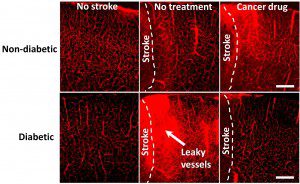
“A big challenge in treating stroke is understanding how other health conditions affect recovery,” says Craig Brown, a neuroscientist in UVic’s Division of Medical Sciences “Many diseases increase the chances of having a stroke, and they also limit recovery. Diabetes is one of these diseases, affecting millions in Canada. Much like a five-card poker hand, the unique collection of health concerns a patient holds in their hand likely dictates how they should be treated.”
The reasons behind the poorer prognosis for stroke recovery are unknown. However Brown’s neurobiology lab is providing new clues.
“What we’ve found is that diabetic mice have leakier blood vessels in the brain after stroke than mice without diabetes. These leakier vessels lead to greater movement of proteins and other damaging elements of blood plasma into the brain, a process that is normally regulated in a strict manner to protect brain health,” he explains.
The study traces the cause of leaky vessels to excessive “vascular endothelial growth factor,” (VEGF) signaling, which regulates the growth and permeability of blood vessels. Fortunately, several drugs, known as VEGF inhibitors, have been developed over the last few decades to block cancerous tumours from growing new blood vessels and spreading.
Brown’s lab used one of these cancer drugs in mouse models to see if they could reduce blood vessel leakage and the damaging effects of stroke.
As it turned out, the treatment not only helped reduce the leakiness of blood vessels, but it also prevented the loss of neural connections and improved the recovery of sensory-motor function—a discovery that could lead to better recovery rates for diabetic patients after stroke.
Quite surprisingly, however, the same treatment had no benefits in non-diabetic mice, suggesting that when it comes to betting on a stroke treatment, you really have to know what cards you’re holding.
 The study’s results were published today, April 1, in The Journal of Neuroscience.
The study’s results were published today, April 1, in The Journal of Neuroscience.
For more information on Brown and his research is available here. Watch a video of Brown talking about his field of research here.
Media contacts:
Craig Brown (Division of Medical Sciences) at 250-853-3733 or brownc@uvic.ca
Denise Helm (University Communications + Marketing) at 250-721-7656 or dhelm@uvic.ca
Source of text and image: University of Victoria
Original research article: Delayed Inhibition of VEGF Signaling after Stroke Attenuates Blood–Brain Barrier Breakdown and Improves Functional Recovery in a Comorbidity-Dependent Manner
Patrick Reeson, Kelly A. Tennant, Kim Gerrow, Josh Wang, Sammy Weiser Novak, Kelsey Thompson, Krista-Linn Lockhart, Andrew Holmes, Patrick C. Nahirney, and Craig E. Brown
The Journal of Neuroscience, 1 April 2015, 35(13):5128-5143; doi:10.1523/JNEUROSCI.2810-14.2015
View a figure from this article on the cover of the Journal of Neuroscience
